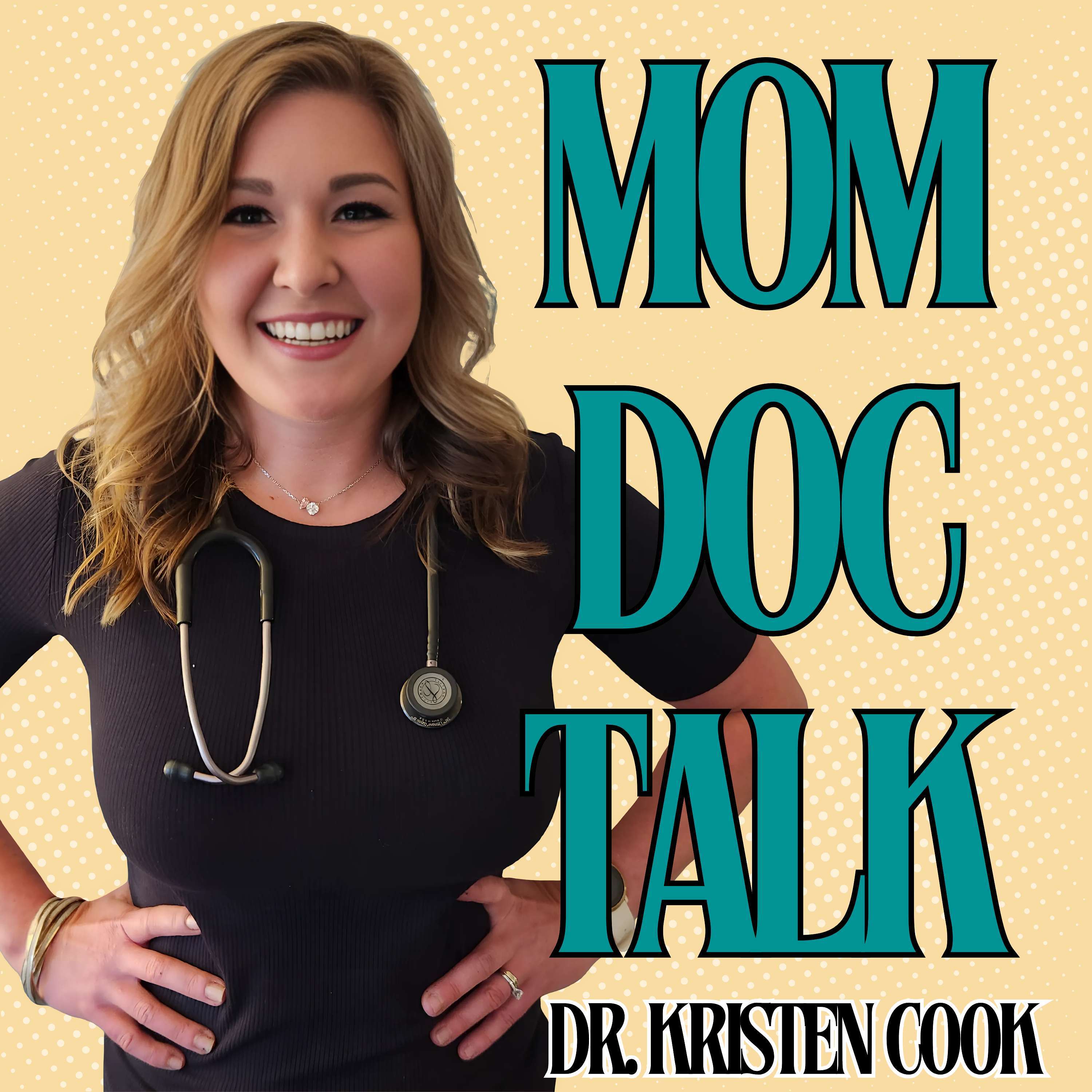
What Happens When Your Child Has a Seizure? A Mother's Story of Fear and Resilience
01/16/25 • 13 min
In this episode of MomDoc Talk, hosted by Kristen Cook, a mother and healthcare professional recounts a traumatic experience involving her daughter, Savannah, who suffered a febrile seizure on March 18, 2017. The speaker shares the emotional turmoil and challenges of managing a medical emergency as both a parent and a pediatrician. She emphasizes the importance of being prepared for such situations, particularly through CPR certification. The episode serves as both a personal testimony and a public service announcement, encouraging parents and caregivers to be proactive in emergency preparedness and understanding febrile seizures in children.
- Personal account of a traumatic medical emergency involving a child.
- Experience of a mother who is also a healthcare professional.
- Description of a grand mal seizure and its symptoms.
- Importance of emergency preparedness and CPR certification for parents and caregivers.
- Educational information about febrile seizures, their causes, and prevalence in children.
- Emotional impact of witnessing a child's medical crisis on a parent.
- The role of medical professionals during emergencies and the comfort of familiar faces.
- Challenges of balancing parental instincts with professional knowledge in a crisis.
- Long-term effects of a child's health scare on family dynamics and emotional well-being.
- Encouragement for proactive measures in emergency situations and cherishing family moments.
The information in this podcast is for educational and informational purposes only. It is not a substitution for professional medical advice, diagnosis, or treatment. Always seek the advice of your healthcare provider for medical issues. All the opinions are of Dr. Kristen Cook and do not reflect the opinions of her employer nor the hospitals she is affiliated with. The authors and publishers of this podcast do not assume any responsibility for errors, omissions, or consequences of using the information provided.
If you enjoyed this episode, please subscribe and leave a review wherever you get your podcasts!
Follow Dr. Cook at: https://www.facebook.com/MomDocTalk/
https://twitter.com/momdoctalk
https://www.tiktok.com/@momdoctalk_kcmd?lang=en
In this episode of MomDoc Talk, hosted by Kristen Cook, a mother and healthcare professional recounts a traumatic experience involving her daughter, Savannah, who suffered a febrile seizure on March 18, 2017. The speaker shares the emotional turmoil and challenges of managing a medical emergency as both a parent and a pediatrician. She emphasizes the importance of being prepared for such situations, particularly through CPR certification. The episode serves as both a personal testimony and a public service announcement, encouraging parents and caregivers to be proactive in emergency preparedness and understanding febrile seizures in children.
- Personal account of a traumatic medical emergency involving a child.
- Experience of a mother who is also a healthcare professional.
- Description of a grand mal seizure and its symptoms.
- Importance of emergency preparedness and CPR certification for parents and caregivers.
- Educational information about febrile seizures, their causes, and prevalence in children.
- Emotional impact of witnessing a child's medical crisis on a parent.
- The role of medical professionals during emergencies and the comfort of familiar faces.
- Challenges of balancing parental instincts with professional knowledge in a crisis.
- Long-term effects of a child's health scare on family dynamics and emotional well-being.
- Encouragement for proactive measures in emergency situations and cherishing family moments.
The information in this podcast is for educational and informational purposes only. It is not a substitution for professional medical advice, diagnosis, or treatment. Always seek the advice of your healthcare provider for medical issues. All the opinions are of Dr. Kristen Cook and do not reflect the opinions of her employer nor the hospitals she is affiliated with. The authors and publishers of this podcast do not assume any responsibility for errors, omissions, or consequences of using the information provided.
If you enjoyed this episode, please subscribe and leave a review wherever you get your podcasts!
Follow Dr. Cook at: https://www.facebook.com/MomDocTalk/
https://twitter.com/momdoctalk
https://www.tiktok.com/@momdoctalk_kcmd?lang=en
Previous Episode

Are Your Child's Play Skills Developmentally Appropriate?
In this podcast episode, pediatrician Kristen addresses parents' concerns about their children's social interactions and developmental play stages. The episode educates parents on the stages of play identified by psychologist Mildred Parton, from unoccupied play to cooperative play. Kristen reassures parents that various play styles are normal and essential for psychosocial development. By understanding these stages, parents can set realistic expectations and support their children's social and emotional growth. The episode emphasizes that play is crucial for developing skills such as creativity, empathy, and problem-solving, and that children will naturally progress through these stages over time.
- Concerns of parents regarding children's social interactions and developmental milestones.
- Explanation of different stages of play as identified by psychologist Mildred Parton.
- Evolution of children's play from observation to solitary and interactive forms.
- Importance of setting developmentally appropriate expectations for children's social behavior.
- Case study of a 19-month-old girl illustrating common parental concerns and developmental norms.
- Role of play in psychosocial development and essential skill acquisition.
- Overview of the six stages of play: unoccupied, solitary, observer, parallel, associative, and cooperative play.
- Normalcy of limited peer interaction in young children and its developmental appropriateness.
- Encouragement of positive social interactions through praise for cooperative behavior.
- Significance of pretend play in promoting social, emotional, and cognitive development.
The information in this podcast is for educational and informational purposes only. It is not a substitution for professional medical advice, diagnosis, or treatment. Always seek the advice of your healthcare provider for medical issues. All the opinions are of Dr. Kristen Cook and do not reflect the opinions of her employer nor the hospitals she is affiliated with. The authors and publishers of this podcast do not assume any responsibility for errors, omissions, or consequences of using the information provided.
If you enjoyed this episode, please subscribe and leave a review wherever you get your podcasts!
Follow Dr. Cook at: https://www.facebook.com/MomDocTalk/
https://twitter.com/momdoctalk
https://www.tiktok.com/@momdoctalk_kcmd?lang=en
Next Episode

Discipline vs. Punishment: Understanding the Key Differences for Effective Parenting
In this episode of "Mom Doc Talk," pediatrician Dr. Kristen Cook discusses effective parenting strategies, focusing on the difference between discipline and punishment. She emphasizes the importance of modeling behavior, providing consistent discipline, and clear communication. Dr. Cook explains that discipline aims to teach and support children, contrasting with punishment, which often leads to negative emotions. She offers practical advice, including age-appropriate consequences and the importance of follow-through. Dr. Cook also shares personal experiences, encouraging parents to be patient and give themselves grace. The episode aims to equip parents with tools to foster positive behavior in their children.
- Distinction between discipline and punishment in parenting.
- Importance of modeling behavior for children.
- Role of consistent discipline in teaching appropriate behaviors.
- Emotional support as a key component of effective discipline.
- Negative effects of punishment on children's emotional well-being.
- Age-appropriate consequences for misbehavior.
- Importance of clear communication about desired behaviors.
- Need for consequences to fit the behavior.
- Encouragement for parents to be patient and forgiving of themselves.
- Viewing discipline as a learning tool rather than a punitive measure.
The information in this podcast is for educational and informational purposes only. It is not a substitution for professional medical advice, diagnosis, or treatment. Always seek the advice of your healthcare provider for medical issues. All the opinions are of Dr. Kristen Cook and do not reflect the opinions of her employer nor the hospitals she is affiliated with. The authors and publishers of this podcast do not assume any responsibility for errors, omissions, or consequences of using the information provided.
If you enjoyed this episode, please subscribe and leave a review wherever you get your podcasts!
Follow Dr. Cook at: https://www.facebook.com/MomDocTalk/
https://twitter.com/momdoctalk
https://www.tiktok.com/@momdoctalk_kcmd?lang=en
If you like this episode you’ll love
Episode Comments
Generate a badge
Get a badge for your website that links back to this episode
<a href="https://goodpods.com/podcasts/momdoctalk-with-kristen-cook-md-629949/what-happens-when-your-child-has-a-seizure-a-mothers-story-of-fear-and-84073154"> <img src="https://storage.googleapis.com/goodpods-images-bucket/badges/generic-badge-1.svg" alt="listen to what happens when your child has a seizure? a mother's story of fear and resilience on goodpods" style="width: 225px" /> </a>
Copy




